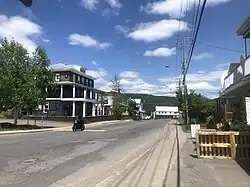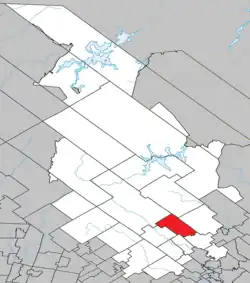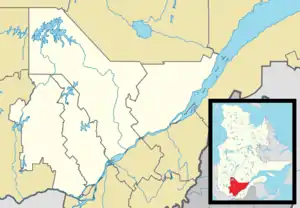Sainte-Émélie-de-l'Énergie
Sainte-Émélie-de-l'Énergie is a municipality in the Lanaudière region of Quebec, Canada, part of the Matawinie Regional County Municipality.
Sainte-Émélie-de-l'Énergie | |
|---|---|
 | |
 Location within Matawinie RCM. | |
 Sainte-Émélie-de-l'Énergie Location in central Quebec. | |
| Coordinates: 46°19′N 73°39′W[1] | |
| Country | |
| Province | |
| Region | Lanaudière |
| RCM | Matawinie |
| Settled | 1854 |
| Constituted | June 10, 1884 |
| Government | |
| • Mayor | Martin Héroux |
| • Federal riding | Joliette |
| • Prov. riding | Berthier |
| Area | |
| • Total | 156.20 km2 (60.31 sq mi) |
| • Land | 150.08 km2 (57.95 sq mi) |
| Population (2021)[3] | |
| • Total | 1,741 |
| • Density | 11.6/km2 (30/sq mi) |
| • Pop 2016-2021 | |
| • Dwellings | 1,142 |
| Time zone | UTC−5 (EST) |
| • Summer (DST) | UTC−4 (EDT) |
| Postal code(s) | |
| Area code(s) | 450 and 579 |
| Highways | |
| Website | www.ste-emelie -de-lenergie.qc.ca |
Geography
.jpg.webp)
The territory of Sainte-Émélie-de-l'Énergie extends along the Noire River valley in the foothills of the Laurentian Mountains. The village itself is located at the intersection of Routes 131 and 347, in a broad valley called the Grand Lanaudière Corridor, which marks the transition between the Lower and Upper Laurentians. Route 131 winds north through the Noire River valley to Saint-Zénon and Route 347 goes through the Great Corridor to Saint-Côme.[4]
Sainte-Émélie-de-l'Énergie is located in the heart of the Laurentian hardwood zone and its hills are covered by a mixed forest. Tree species include sugar maple, yellow birch and white birch.[4]
History
One of the first settlers was Jean-Antoine Leprohon who arrived in 1854. He was an employee of the Quebec Parliament but had an ambition to found a colony or settlement just like his cousin Barthélemy Joliette who was the founder of the City of Joliette. In 1870, the Parish of Sainte-Emmélie-de-l'Énergie was formed. This name honors the memory of Émélie or Emmélie, the wife of Leprohon, whereas the word Énergie (French for "energy") may have referred to the exuberance of his wife or to the rallying cry that Leprohon had to use to keep the other settlers stay around him: "we need energetic settlers here."[1][5]
In 1884, the Parish Municipality of Sainte-Émélie-de-l'Énergie was established. On May 30, 1924, a large fire engulfed the village, destroying 60 homes and the church. In 1994, the parish municipality changed status to become a municipality.[1][5]
Demographics
Population
|
|
|
Private dwellings occupied by usual residents: 841 (total dwellings: 1142)
Language
Mother tongue:[7]
- English as first language: 1.1%
- French as first language: 96.6%
- English and French as first language: 0.6%
- Other as first language: 1.1%
Education
The Commission scolaire des Samares operates francophone public schools
- École de l'Ami-Soleil [8]
The Sir Wilfrid Laurier School Board operates anglophone public schools, including:
- Joliette Elementary School in Saint-Charles-Borromée[9]
- Joliette High School in Joliette[10]
See also
References
- "Sainte-Émélie-de-l'Énergie (Municipalité)" (in French). Commission de toponymie du Québec. Retrieved 2009-11-27.
- "Geographic code 62070 in the official Répertoire des municipalités". www.mamh.gouv.qc.ca (in French). Ministère des Affaires municipales et de l'Habitation.
- Statistics Canada 2021 Census - Sainte-Émélie-de-l'Énergie census profile
- "Renseignements généraux" (in French). Municipalité de Sainte-Émélie-de-l'Énergie. Retrieved 2009-11-27.
- "Historique de la municipalité" (in French). Municipalité de Sainte-Émélie-de-l'Énergie. Retrieved 2009-11-27.
- Statistics Canada: 1996, 2001, 2006, 2011, 2016, 2021 census
- Statistics Canada 2021 Census - Sainte-Émélie-de-l'Énergie community profile
- "de l'Ami-Soleil." Commission scolaire des Samares. Retrieved on September 23, 2017.
- "JOLIETTE ELEMENTARY ZONE." Sir Wilfrid Laurier School Board. Retrieved on September 17, 2017.
- "Joliette High School Zone Sec 1-5." Sir Wilfrid Laurier School Board. Retrieved on September 5, 2017.